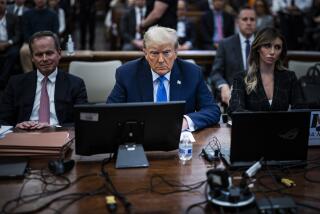Can Democrats leverage Trump’s legal problems in the midterm election or will they overreach?

Mounting legal problems confronting President Trump are rattling the national political map, spurring Democrats to rethink their midterm election strategy and forcing Republicans to distance themselves from politically damaging indictments and convictions
The debate around impeachment — or Washington corruption, as many Democrats prefer to frame it — promises to dominate scores of congressional races.
“If you didn’t think the midterms were about impeachment, you certainly do now,” said Michael Caputo, who was a Trump campaign advisor. “The Republican chances of maintaining the House got dramatically slimmer.”
As if the convictions and guilty pleas of close Trump associates were not trouble enough, he said, the recent indictments of two Republican House members who were among the president’s earliest loyalists have created a full-blown political crisis for the GOP.
“I don’t know any credible Republican analyst who isn’t sounding the alarm,” Caputo said.
The convictions of Trump’s former personal attorney Michael Cohen and former campaign manager Paul Manafort have Democratic strategists scrambling to capitalize, even in Trump-country districts where tearing down the president was until this week seen as a risky strategy.
“What the polling shows is it doesn’t matter if you are Republican, a Democrat or an independent, people don’t like corruption in Washington,” said Rep. Ted Lieu of Los Angeles, a vice chair of the Democratic Congressional Campaign Committee.
“There is a stunning amount of criminal activity in this administration. … In any other era in America, we would be having immediate congressional hearings on potential campaign finance violations by the president of the United States,” Lieu said. “The fact that is not happening shows how out of touch the Republicans are with the American people and the actual facts of what is happening.”
But Democrats would be wise to proceed cautiously. They need look back to only the impeachment of one of their own, former President Bill Clinton, for a lesson on the dangers of overreach. Their challenge could be building a case around “corruption,” but avoiding talk of “impeachment” that could turn off crucial swing voters who are not itching for the president to be driven from office.
“Most Democrats in swing districts or red districts would probably do well to let the convictions speak for themselves,” said David Wasserman, who tracks House races for the Cook Political Report. “Democratic voters were already fired up over President Trump. To the extent Democrats talk more about impeachment, it has the potential to motivate Republican voters who believe the president is under siege.”
The Cook Political Report changed its forecast for just one congressional race following Tuesday’s deluge of news around criminal activity by Republicans. The shift was for the seat held by Rep. Duncan Hunter (R-Alpine), who, along with his wife, was hit with a stinging federal indictment Tuesday. It alleges misuse of $250,000 in campaign funds for personal expenses. Hunter is accused of transgressions as varied as trying to pass off personal purchases of golf wear as donations to wounded veterans and using campaign accounts to cover the cost of Riverdance tickets. Cook moved the seat from “solid” to “lean” Republican.
Some Democrats in tough races were heeding Wasserman’s advice to let the convictions of Manafort and Cohen speak for themselves. “I’m busy,” said North Dakota Sen. Heidi Heitkamp, brushing off a reporter’s questions in the Capitol on Wednesday morning. Sen. Jon Tester of Montana was measured in his reaction to Trump’s personal attorney implicating the president in a crime. “I’m not a fan of impeachment, but certainly [we’ve got to] hold people accountable,” he said.
Down in southern West Virginia, where polls show state Sen. Richard Ojeda, a populist Democrat, has the potential to win a House district Trump carried by nearly 50 points, the candidate had little to say about Trump’s troubles.
“I’m watching the news and it looks like an MTV reality show, but it’s not what the people around here are worrying about,” he said. “They go to bed wondering if they will have a job the next day. Who cares about the circus that is going on up there? Right now we are just trying to help these people survive.”
Democratic operatives say their challenge is linking the bread-and-butter issues — like healthcare and recent tax cuts that were skewed toward helping the wealthy — to the political corruption unfolding in court rooms. Tying it altogether was key to Democrats taking over the House in 2006, at a time voters were fed up with the rampant corruption among an earlier generation of Republicans. At that time, the scandal around lobbyist Jack Abramoff had led to his conviction and those of 21 others, including White House officials and a congressman. House Majority Leader Tom DeLay was indicted as well, but his conviction was ultimately overturned.
“We need to show the cost middle-class families are paying for all this corruption,” said Patrick McHugh, executive director of Priorities USA, a major Democratic political action committee. “This is not just about the individuals convicted yesterday and the days before. It is also about how Trump and the Republican Party pushed through massive tax cuts for Big Pharma, allowing them to rake in massive campaign contributions at the same time medical care costs are going up and people are getting shafted.”
House Minority Leader Nancy Pelosi (D-San Francisco) tried to map out a strategy Wednesday. In a letter to colleagues, she railed against the “cesspool of self-enrichment, secret money and ethical blindness” she said the GOP corruption cases exposed. She called on colleagues to demand Republicans investigate the president’s “relentless assault” on the FBI and special counsel Robert S. Mueller III, who is looking into Russia’s election interference and whether Trump or aides conspired.
But she also cautioned the lawmakers to “stay focused on delivering our economic message” — which now includes “cleaning up corruption.”
It all puts Republicans in a bind. They will be under increasing pressure in the coming weeks to hold hearings and investigate more aggressively. Any hedging could hurt them with voters. But being perceived as turning on Trump carries its own political costs. GOP stalwarts are hoping their party’s candidates will find salvation in Democrats overplaying their hand.
“I have some confidence that our Democratic friends are going to overreach and this will be all about impeachment,” said Sen. John Cornyn (R-Texas). “I hope that we would take out time and study the facts and let the court system work its work.”
White House Press Secretary Sarah Huckabee Sanders accused Democrats of a game plan that is “nothing more than attacking the president and looking at cheap political stunts while this White House and Republicans in the House and Senate are focused on actually doing good things for the American people.”
Concerns that such an argument could stick has driven Democratic leadership to advise against using the “i” word in campaigns, touching off a fierce argument among progressives. California billionaire and top Democratic donor Tom Steyer, whose campaign to impeach the president has amassed 5.6 million signatures, is dismayed that candidates are still being advised to keep their distance from his movement.
“We are seeing increasing evidence of what a reckless and dangerous and lawless president we have,” Steyer said in a phone interview. “The question is what are we going to do about it? Simply saying it is bad without doing anything about it is normalizing it. … Ducking a truth and talking about other things is not a way to repair a broken system.”
Steyer dismisses as nonsense warnings that talking about impeachment will hurt candidates in Trump country. He points to the millions of people who have signed onto his campaign, most of them millennials. In every congressional district Steyer has targeted, he said, it has enlisted 8,000 people who don’t normally vote and another 5,000 who do. It is enough, Steyer asserts, to tip a close congressional election.
“Of course people care about local issues that affect them,” Steyer said. “But the corruption and lawlessness of this presidency are part and parcel of the corporate takeover of our democracy. Telling the truth about that lawlessness is part of taking it back.”
Times staff writers Mark Z. Barabak, Noah Bierman and Eli Stokols contributed to this report.
The latest look at the Trump administration and the rest of Washington »
More stories from Evan Halper »
evan.halper@latimes.com | Twitter: @evanhalper
UPDATES:
2:50 p.m.: This article was updated with comments from Pelosi and Sanders.
This article was originally published at 12:50 p.m.
More to Read
Get the L.A. Times Politics newsletter
Deeply reported insights into legislation, politics and policy from Sacramento, Washington and beyond. In your inbox three times per week.
You may occasionally receive promotional content from the Los Angeles Times.








